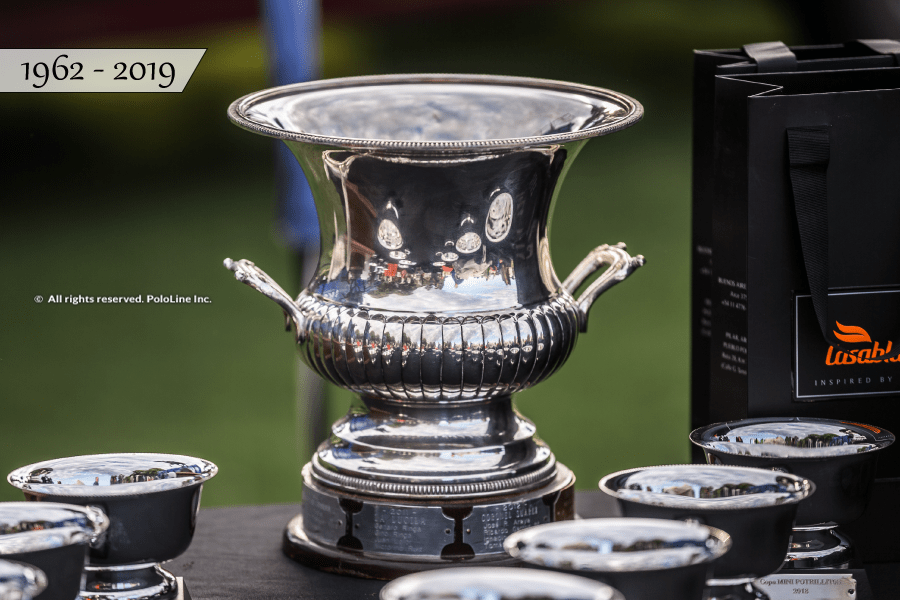One of the most traditional and enjoyed post-Palermo events is, without a doubt, the Potrillos Cup, the most prestigious kids polo tournament in the world. The latest edition was held on December 16, and saw 60 teams compete. That amounts to a total of 240 kids aged between 5-14. They were all split into categories according to their age, as well as the Golden Potrillos and the Silver Potrillos.
The tournament, which was played over the course of a day, was held at the AAP in Pilar. Up and coming stars of all ages gathered for a day of fun. Many of them were the children of some of the world’s best players, and they were able to rely on the help and support of these superstars.
The Potrillos Cup has a rich history, which began “on October 12, 1962, on the number one ground of Los Indios, when we played four chukkas against Los Picapiedra in the first edition of the Potrillos Cup,” shared Carlos “Chuni” Acuña, a man with an exceptional memory.
Back then, however, it was not so easy to put the whole thing together. “I can assure you that Juan Carlos Echeverz, Eduardo Amaya, and I struggled to find eight players for a match. We worked hard on it for a long time. Now there are sixty teams and 240 players—it’s crazy!”
Los Indios Club was almost like home for Chuni and his friends. “We started going to Indios when we were very young,” tells Chuni. “My father played there, and then he took on the role of umpire for many years. We have polo in our blood, just as Juanca and Eduardo do, thanks to their parents. Juan Echeverz and Talo Amaya—we were second generation polo players. So we decided to set up a kids match, as we couldn’t yet play the Inter-collegiate (I played in 1963). We started looking for players, and we put together two teams. I must highlight that when I put my team together, I did so with the intention of winning. As as you will find out, the result was not at all the one I expected!”
That day in 1962, the Potrillos Cup was officially inaugurated. Representing Los Indios, in the traditional white shirt with a horizontal black line, were Ignacio Goñi (1), Horacio Brave (2), Juanca Echeverz (3) and Chuni Acuña (4). Playing for Los Picapiedras was Carlos Landri (1), Eugenio Brave (2), Eduardo Amaya (3) and Luis María Balbiani (4). All eight players were aged between 13 and 15.
“The umpire was Segundo Vilariño, another prominent name in polo, who ended up playing well into his 70s,” shares Chuni. “My father played there, and then he took on the role of umpire for many years. We have polo in our blood, just as Juanca and Eduardo do, thanks to their parents. Juan Echeverz and Talo Amaya—we were second generation polo players. So we decided to set up a kids match, as we couldn’t yet play the Inter-collegiate (I played in 1963). We started looking for players, and we put together two teams. I must highlight that when I put my team together, I did so with the intention of winning. As as you will find out, the result was not at all the one I expected!”
In terms of horses, Roberto Tonnelier, a very good friend of Carlos Acuña, Chuni’s father, lent a few horses to the intrepid children. “He lent me two for that match: Torito and Calandria,” continues Chuni. Alberto Pedro Heguy also helped out with the horses, specifically giving Juanca Echeverz, a hand, at which Chuni remebers: “Juanca told Alberto Pedro that he would rather play his fathers horses; Eduardo Amaya saw his chance and quickly grabbed Alberto Perdo’s horses. I suppose I don’t have to clarify that Los Picapiedras won the match 4-2.”
In 2011, on the 50th anniversary of the Potrillos Cup, Chuni Acuña and Juanca Echeverz, two of the first players to compete in the tournament, presented the prizes to the latest winners. “Ruso Heguy continued the organisation of the tournament, but the cup was born a few years before he was,” says Chuni.
“I have wonderful memories of that first Potrillos Cup, and they all come back to me as I share them with you now,” concludes Chuni. “The night before the match was crazy; I looked up at the sky, the stars, and prayed that it would not rain, because the match was set for the morning. And it was a success, there were a lot of people: our fathers, friends, and families. My biggest wish is that all eight of us who were on that field that day in October, 1962, will still be present in 2020 to award the prizes to the winners of the 60th anniversary of the tournament. That would be spectacular.”

